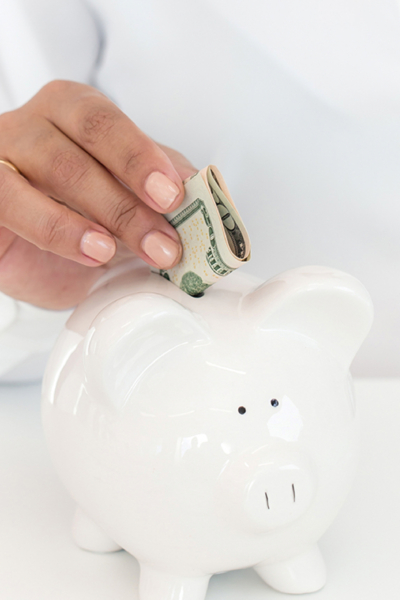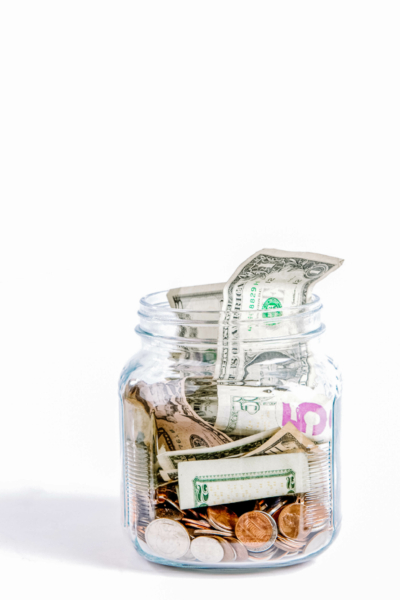Before I became a stay-at-home mom, I had spent my career in the financial world and banking industry employment. I spent almost a decade in that field and had worked for many large, well-known banks to small credit unions and everything in between. Any banking job you can think of! I worked for a very large upscale banking institution in CA where I funded cars from the MANU to the dealer and touched millions of dollars a day. I’ve worked in small mom and pop financial institutions giving loans, being a financial advisor, helping people balance their checkbooks. I’ve run collections, I’ve given people loans for credit cards, house investments, cars, personal loans. I’ve done data entry and stuffed envelopes. I’ve held a few managerial positions. I’ve held employee of the month titles. I’ve raised more capital in my first month working for a well-known bank than my co-workers who had been at their jobs for over 3 years.
I sold credit cards, had great customer relationships, and above all, I outsold any of my fellow co-workers at every job I’ve worked. I’ve been bonded for a quarter of a million dollars. I’ve helped stop fraud, I’ve worked in fraud departments. I’ve helped stop employee theft, I’ve done payroll and accounting for entire financial institutions, customers included. I’ve done it all and seen almost everything. At least, I sure as heck hope I have!
Why am I telling you all this? Is it to sit all high and mighty? Absolutely not. But if your going to listen to what I have to say, you need to know that I have the credentials to back up what I say, because, let’s face it, so many people claim all this and more and none of it is true. Many people online are “experts” in their own minds, but not really where it counts.
In almost a decade of working in the financial setting, here are the most important things you should know and the banking secrets revealed.
1) Banks suck! Never work for a bank and never join a bank as a customer.
Choose credit unions and become a credit union member instead. Some of the biggest most well-known banks in America are nothing more than frauds. Banks have stock-holders and as such, they have one mission in life. To make Mr. Stockholder rich. You do all the work; they get all the pay. Some more friendlier banks offer incentives to employees in the form of bonuses, most, and it kills me to say this, incentive with jobs. As an employee, if you don’t sell a certain amount, you don’t work there. I’ve seen 3-year-old employees let go because they slipped up ONE month and came 20% less than quota. Banks don’t care. Why should they; they can hire someone else to fill that spot in a matter of days.
At a credit union, its employee based, much like Winco. YOU get a share of the profits. They call that dividends. You get interest on checking, savings, the whole sha-bang. When they profit, so do you! There’s no stockholder at the top sucking up all that cash. It’s distributed within the company, and you are equal with employees. Credit unions also tend to give regular bonuses to their employees and it’s not performance-based, which means you don’t have to be ruthless, you can be nice, HONEST even, and still get paid!
Credit unions generally care about the people. Because the people are technically part owner and NCUA protects credit unions better than banks in my opinion. As a part of NCUA, your accounts are insured up to $250,000 if the credit union goes belly up and takes off and runs. If banks do that, while the amount of coverage is the same, there seems to be more red tape to cross.
2) Banks push overdraft fees.
Oh they LOVE overdraft fees! I have personally seen upwards of $600 in overdraft fees ALONE on a $20 overdraft tab! Banks encourage it. They literally make their rules around encouraging it. I remember one time at U.S. Bank (the WORST bank in the world), that a customer came through the doors so distraught. He said that he just pulled out $20 from the ATM and it didn’t say his balance until AFTER it gave him the cash. Red flag #1, it gave him cash automatically even though that would overdraft him! Red flag #2, it didn’t tell him his balance until AFTER he withdrew the money. You think that the bank doesn’t set that all up!!!
He was frantically telling me to just deposit the money back into his account. He didn’t want to go overdraft as the fee was upwards of $40. He kept saying, just put it back, just put it back. Am I going to get charged for this? Of course, no one could guarantee him he wouldn’t. No manager would comment conveniently. I checked his account the next day. Sure enough, there was an overdraft fee and he mentioned he didn’t get paid for another 3 days.
Let me tell you something. Every DAY that you’re in the red, some banks charge. This man was out $120 for 3 mins of being in the red. I was outraged, but of course, there was nothing I could do. I asked my manager if we could waive those fees. The man didn’t know yet, but I’m sure he would find out. The manager said, “Listen, you’re new here, but we don’t waive fees. In fact, we like it when they overdraft.” Still pretty naive. I didn’t get it at the time, but I would later figure out the scheme. There are so many major scams going on, it would make your head spin and due to uh…MORALS, I had to quit. Never bank at U.S. Bank!
3) Bankers are not your friends.
Ok, I know this is going to hurt a lot if you think that your banker is the best banker and they know you by name and they love you, adore you, and would never steer you wrong. But I’m a straight shooter, so here goes.
Remember in #1 where you HAVE to sell in order to keep your job. Uh yeah, that’s how they do it. You become a customer’s “friend,” gain their trust, make them feel like you are on their side and not the banks’, and then bam, they just talked you into some $20,000 line of credit that you had no intention of applying for. But, they know best and you trust them so you do it. At every single institution I’ve worked for, that is the protocol. They treat MANY people like that, trust me! It’s their job. That is how banks and credit unions alike, sell.
Now, I’ll grant you that credit unions care more than banks do, but it is always still about the American dollar. In every profession on every continent in the world, it’s always about the money. Maybe, just maybe, you have a wonderful banker friend who would never sell you something you don’t need. Yeah, uh, those tellers don’t last long. They don’t produce enough sales and so are discarded and replaced once management finds out.
I remember working for a particular credit union and they had this specialist come in and we had training and everything, how to sell to a customer without them knowing their being sold. Psychology was the forerunner in all that. And I admit, I wasn’t saved at the time, and I could have sold you ocean front property in Arizona. I was good at it. I was one of the bests in every company I worked for because I did actually care about the customer. I sold in such a way that I truly WAS on the customers’ side, so everyone wanted to talk to me. I knew the ins and outs of the rulebook of the companies I worked for, and therefore, knew how to go around the rules to get the customer the best deal that was right for them. Because I was so good at it, people would request ME, I made my sales each month, and that’s all the banks cared about, numbers.
4) Most banks are not robbed as much as the average person believes.
Yes, I’ve known people held up and stuffed in the vault and yes, it can happen. But there is an amazing amount of security in all banks and credit unions, and we are taught exactly what to do to prevent it and what to do in each situation. There are secret things tellers do at the time they are being robbed to alert police instantly. We know when and where it’s most likely to happen, what most robbers do/how they act, and what to do to actually catch them while they are still in the bank. The training is horribly boring and horribly extensive and there are tests you need to pass to even get on the floor. I would say that anyone who robs a bank is just looking for an easy way to go to jail.
5) Tellers do not verify cash.
I hear it all the time as I’m checking people’s cash they give me if I’m selling something say on Craigslist. “It’s good; I got it at the bank.” Yeah, do you really think bankers have enough time to sit there and check every single bill that comes through? No. The ONLY time we checked bills is if something looked odd to us and the longer you work in banking, the more you know a bill like the back of your hand. You can smell what denomination it is. Ok, not really, haha. But close. So, as a customer it is YOUR job to check the bills AT THE COUNTER. Once you leave that teller counter, even with all the camera’s, they won’t do anything about it. On a similar note, all bills that have at least 3/4 of the bill in tact, whether taped together or washed in the washer, ARE valid. Anything less than 3/4 will not be accepted. It used to be 1/2 but there was too much fraud.
6) NEVER, I repeat NEVER EVER give your check to someone you don’t know.
At a yard sale, on Craigslist, to a private party you just met, etc. Once that person has your account number, they don’t even need the routing number, you can call any bank and get that. It’s public information, even if you don’t have an account. Once they have that number, they can do bad, bad things with it. It’s not worth it.
7) Never wire money out of the country unless you know the person personally.
Now, I would think this is common sense, but that sensibility skipped a lot of people in my banking days. Banks do not cover you in such cases. I have personally seen one gal lose $600 in one transaction and oddly enough, she WORKED for the bank!
8) Don’t fall for the “phishing scheme.”
Bank phishing scams are basically a phone call, email, or text that says your bank account is overdraft or this is an urgent message, you need to login right away. You follow their link, they track your information, they get the login info, and your…well…in a boat without a paddle. A sitting duck, if you will. If you get such an email, login in under ANOTHER browser from your banks mainframe site. This will ensure no tracking of your personal information.
9) Check your accounts regularly.
If you start to see a charge that is not yours, report it immediately. You have a 90 day window to report it. If you report it within that specified amount of time, the bank has 48 hours, by law, in which to put ALL the money into your account. This is the part they don’t tell you. They will say, we will research it. Some try to get out of it, but they must, because it is governmentally audited! You ARE protected in such cases. Do not fear.
10) Most of the fraud at financial institutions occurs in the night drop boxes and ATM’s.
Look, I’ll tell you plainly, if you use the ATM or night drop, you are chancing something in 2 ways. First, it’s the most susceptible to robbery. Secondly, most of the time, those transactions are posted by ONE person…..there is usually NO accountability. I’ve seen things, that’s all I can say at SEVERAL places I’ve worked for. While it’s not the ‘norm,’ it has happened. When it does, what proof do you have?????? Checks you can prove, sure. Cash, you cannot. Don’t take that chance. P.S. If a banker is caught stealing, it’s an automatic fire. IF being the operative word. Generally what they do is put the money in another place in their till, so the camera’s see it going in. Later on, they take the money and head to a place in the bank that is not monitored by camera’s and put it on their person or in their purse. Most banks aren’t going to sift through all that footage, unless theirs a major problem, and who’s to say they weren’t taking the cash out and doing something else with it. It’s simple to avoid. Never put cash in the ATM or night-drop.
Even if there are two people counting it for accountability, you think people don’t talk. You think there aren’t scams where the two are crooks? I’ve seen it. And you can’t tell on them because you have no proof. It’s your word against theirs and usually it’s a manager who’s worked there for years and knows all the ins and outs. You can’t go up against that.
11) At most financial institutions, they have some sort of bank check or teller check that is about $1.
Some banks greedily charge $3, but most are $1. If you need a cashier’s check, your bank will NOT tell you about this option!! Unless you know it walking in, they will NOT OFFER that information. Remember, it’s about money. Cashier’s checks can range in fees from $5-$10 a piece. A teller/bank check is the same thing as a cashier’s check. It’s guaranteed funds. The funds are pulled out right then and there. The only difference is they don’t say “CASHIER’S CHECK” on them. I’ve never seen a recipient company care if it doesn’t have those words on it. So, save yourself some money and opt for teller/bank checks the next time you need a Cashier’s Check.
Ok, one more and then I’ll stop or this will be a book and I’ll have to sell it for $24.95. 😉
12) Do not make a copy of legal monetary bills.
Even if it’s just a gag gift or for personal use. It is against the law and highly punishable.
Disclaimer: These rules apply to most banks and credit unions. They may differ from your local bank, depending on government changes, and individual banking rules. This guide is generally speaking and taken from my experience working as a senior manager in several different institutions in my banking career of 7 years.











